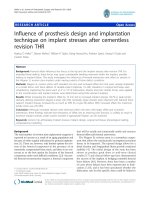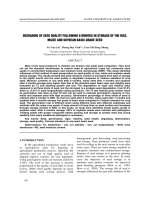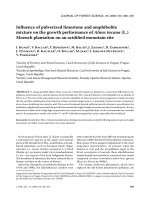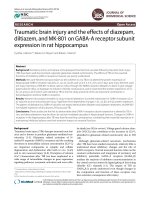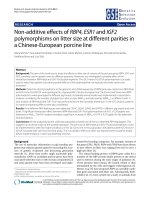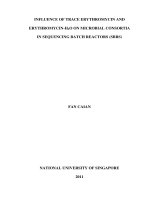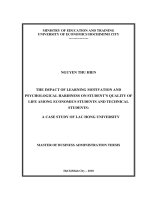Influence of seed treatments and packaging materials on seed quality parameters during storage in buck wheat (Fagopyrum esculentum L.)
Bạn đang xem bản rút gọn của tài liệu. Xem và tải ngay bản đầy đủ của tài liệu tại đây (338.01 KB, 7 trang )
Int.J.Curr.Microbiol.App.Sci (2020) 9(8): 1738-1744
International Journal of Current Microbiology and Applied Sciences
ISSN: 2319-7706 Volume 9 Number 8 (2020)
Journal homepage:
Original Research Article
/>
Influence of Seed Treatments and Packaging Materials on Seed Quality
Parameters during Storage in Buck Wheat (Fagopyrum esculentum L.)
Chelakani Srujana*, Ajay Kumar Pandey and A. K. Chaurasia
Naini Agricultural Institute, SHUATS, Prayagraj-211007, Uttar Pradesh, India
*Corresponding author
ABSTRACT
Keywords
Buckwheat, Neem
oil, Carbendazim,
Polythene bag,
Cloth bag
Article Info
Accepted:
18 July 2020
Available Online:
10 August 2020
A storage experiment was conducted to understand the effect of seed treatments and
packaging materials on seed quality parameters of Buckwheat genotypes during storage at
Seed Testing Laboratory, Department of Genetics and plant Breeding, SHUATS,
Prayagraj, U.P during 2019-2020.The Experiment. Consists of five genotypes viz, IC13140(G1), IC-13143(G2), IC-13144(G3), IC-13191(G4) –IC-13412(G5). Seeds were
treated with Neem oil at 5 ml/kg (T 1) and carbendazim at 2 g/kg (T 2) and seed alone with
control ( untreated T0) and packed in polythene bag (C1) and cloth bag (C2) and maintained
for 9 months under ambient conditions. The results clearly revealed that seeds of IC-13143
(G2) treated with neem oil which were stored in polythene bag were found high
germination percent (82.75 %), root length (12.25 cm), shoot length (9.97 cm), seedling
length (22.22 cm), fresh weight (0.8 g), dry weight (0.07 g), vigour index-I (1839.2),
vigour index-II (5.38) and viability (70).
Introduction
Buckwheat (Fagropyrum esculentum L) is an
annual crop, it is a pseudo cereal but its grains
belong to cereals because of their similar use
and chemical composition (Campbell, 1997).
It is a multipurpose crop. The tender shoots
are used as leafy vegetables. Buckwheat
grains are an important source of
microelements, such as: Zn, Cu, Mn, Se
(Stibilj et al., 2004), and macro elements: K,
Na, Ca, Mg (Wei et al., 2003).
Losses in seed quality occur during field
weathering, harvesting and storage due to
which seeds get damaged. If seeds are
exposed to high temperature and high
humidity, the incidence of microflora is
mainly responsible for the degradation of
protein and other food reserve resulting in
reduction in viability, vigour and germination.
To combat these factors, it is better to store
the seeds in moisture impervious containers
like polythene bag and some are moisture
pervious container like cloth bag to maintain
the quality for longer period. Indiscriminate
use of Chemical and their residual toxicity
adversely affect the seed quality. Many of
synthetic chemicals look effective but they
are not readily degradable physically or
biologically which yield more toxic residues.
Hence, the feasible approach is the treatment
1738
Int.J.Curr.Microbiol.App.Sci (2020) 9(8): 1738-1744
of seeds with botanicals which are safe,
economical, eco-friendly, cheap, easily
locally available and non-harmful to seeds,
animals and human beings. It will be of
immense use to the farming community.
Therefore, the present investigation was taken
up to study the effect of seed treatments on
seed quality characters of buckwheat
genotypes during storage.
Materials and Methods
The experiment was laid down in CRD with
four replications. The Buckwheat seeds IC13140 (G1), IC-13143 (G2), IC-13144 (G3),
IC-13191 (G4) and IC-13412 (G5) were dried
to bring down the moisture content to 10-12
% before proceeding for storage. Seed was
treated with Neem oil at 5 ml/kg (T1),
Carbendazim at 2 g/kg T2) with local control
(T0) stored for 9 months at ambient room
temperature in the seed testing Laboratory of
department of Genetics and Plant Breeding,
Naini Agricultural Institute, SHUATS,
Allahabad with packed in packaging materials
viz polythene bag, cloth bag.
Results and Discussion
Germination percent
The significant differences with respect to
treatments were observed in Table 1. The
seeds of IC-13143 (G2) genotype treated with
biocide (Neem oil at 5 ml/kg) stored in
polythene
bag
recorded
maximum
germination percent (82.75%) followed by
seeds of IC-13140 (G1) (82.70%) treated with
biocide (Neem oil at 5 ml/kg). Now a day’s
botanicals are widely used in place of
fungicides and pesticides for seed treatment to
protect seeds against pests and diseases
during storage. The present results are in
close agreement with the reports of Hanegave
(2009) in wheat.
Root length
The effect of seed treatments on root length
(cm) was significant after 9 months of storage
periods (Table 1). Results revealed that the
seeds of IC-13143 (G2) among all the
genotypes and treated with biocide (Neem oil
at 5 ml/kg) stored in polythene bag recorded
maximum mean root length (12.25 cm)
followed by seeds of IC-13140 (G1) (12.05
cm) treated with biocide (Neem oil at 5
ml/kg).
The beneficial influence noticed with these
botanicals may be related to their protective
nature, antifungal, insecticidal property
besides synergistic effect with amino acids in
germinating seeds to protect the root apical
meristems tissue from damage and enhance
longitudinal root growth, Dileepkumar et al.,
(2009) in cowpea; Raikar et al., (2011) in
Rice; Nargis and Thiagarajan (1991); Paul
and Mishra (1994); Samuel et al., (2008).
Shoot length
The effect of seed treatments on shoot length
(cm) was significant after 9 months of storage
periods (Table 1). Results revealed that the
seeds of IC-13143 (G2) among all the
genotypes and treated with biocide (Neem oil
at 5 ml/kg) stored in polythene bag recorded
maximum mean shoot length (9.97 cm)
followed by seeds of IC-13140 (G1) (9.95 cm)
treated with biocide (Neem oil at 5 ml/kg).
Similar beneficial results with other different
botanicals on germination were reported by
Ntonifor et al., (2011) in rice.
Seedling length
The effect of seed treatments on seedling
length (cm) was significant after 9 months of
storage periods (Table 2).
1739
Int.J.Curr.Microbiol.App.Sci (2020) 9(8): 1738-1744
Table.1 Effect of different treatments on Germination %, Root length and Shoot length of various genotypes of Buckwheat
(Fagopyrum esculentum L.) stored in Polythene bags and Cloth bags
Germination %
Variety
3 Month
6 Month
Root Length
9 Month
3 Month
6 Month
Shoot Length
9 Month
3 Month
6 Month
9 Month
C1
C2
C1
C2
C1
C2
C1
C2
C1
C2
C1
C2
C1
C2
C1
C2
C1
C2
T0G1
91.25
91.25
80.5
80.5
77.25
77.25
13.67
12.57
10.75
9.85
8.85
7.77
9.4
8.3
8.05
7
7.175
6.075
T0G2
96.75
96.5
77.25
77.25
78.25
78.25
10.17
9.07
8.15
7.1
5.75
5.5
8.85
7.75
7.95
6.9
6.95
5.9
T0G3
96
95
78.25
78.25
74
74
7.5
7.3
7.05
6
6.25
5.2
9.725
8.625
8.95
7.9
6.975
5.95
T0G4
93.5
93.25
75.25
75.25
72.5
72.5
12.95
11.9
9.25
8.15
7.55
6.5
9.5
8.4
8.4
7.3
6.9
5.8
T0G5
98.75
99
92.5
92.5
73.25
73
11.25
10.25
9.15
8.1
7.97
6.95
8.45
7.35
7.95
6.9
6.175
5.075
T1G1
97.75
97.75
88.5
87
82.70
77.25
13.94
12.9
12.55
11.45
12.05
11
11.6
10.5
10.1
9.025
9.95
8.7
T1G2
98.5
97.5
84.5
83
82.75
78.25
14.75
13.7
12.85
11.75
12.25
11.12
11.5
10.4
10.1
9
9.975
8.9
T1G3
98.25
97.25
92.5
91
80.25
74
14.82
13.8
12.17
11.07
11.97
10.95
11.95
10.9
10.12
9.025
8.95
7.9
T1G4
96.5
95.75
91.5
90
80.5
72.5
13.45
12.4
11.85
10.8
11.55
10.5
11.6
10.5
9.95
8.9
8.8
7.7
T1G5
98
97
93.25
92.25
80
73.25
13.8
12.8
11.65
10.6
11.17
10.1
10.95
9.9
10.1
9
8.95
7.9
T2G1
97.75
96.75
91.5
90.5
78.25
77.5
13.65
12.6
11.95
10.85
9.85
8.8
10.3
9.2
9.1
8
7.95
6.9
T2G2
97
96
84.5
83.75
79
77.5
13.05
12
9.15
8.05
6.85
5.75
9.95
8.9
8.95
7.9
7.6
6.5
T2G3
93.25
92.5
91.5
90.5
74.25
73.25
11.67
10.57
8.25
7.1
7.32
6.25
10.9
9.8
9.4
8.3
7.975
6.95
T2G4
98.5
97.5
75.5
74
73.5
72
13.12
12.02
10.55
9.45
8.75
7.7
10.85
8.75
9.6
8.5
7.9
6.8
T2G5
97.5
96.5
87.5
86.5
75
73.75
12.45
11.4
10.97
9.95
10.5
9.5
9.9
8.8
9.15
8.05
7.95
6.9
Mean
96.61
95.96
85.63
84.81
77.43
74.95
12.68
11.68
10.41
9.35
9.24
8.24
10.36
9.20
9.19
8.11
8.01
6.93
SE±
0.64
0.42
1.22
0.53
1.01
0.6
0.49
0.20
0.38
0.17
0.45
0.15
0.072
0.06
0.062
0.03
0.03
0.08
CV
1.32
0.33
2.84
1.25
2.60
1.60
7.88
3.45
7.38
3.72
9.94
3.74
1.40
1.51
1.35
0.77
0.77
2.50
CD
0.91
0.60
1.73
0.75
1.44
0.85
0.71
0.28
0.54
0.24
0.65
0.21
0.104
0.09
0.088
0.04
0.04
0.12
1740
Int.J.Curr.Microbiol.App.Sci (2020) 9(8): 1738-1744
Table.2 Effect of different treatments on Seedling length, Fresh weight and Dry weight of various genotypes of Buckwheat
(Fagopyrum esculentum L.) stored in Polythene bags and Cloth bags
Seedling Length
Variet
y
3 Month
6 Month
Fresh Weight
9 Month
3 Month
6 Month
Dry Weight
9 Month
3 Month
6 Month
9 Month
C1
C2
C1
C2
C1
C2
C1
C2
C1
C2
C1
C2
C1
C2
C1
C2
C1
C2
T0G1
23.07
20.87
18.8
16.85
16.02
13.85
0.95
0.8
0.57
0.475
0.5
0.4
0.052
0.04
0.04
0.022
0.02
0.012
T0G2
19.02
16.82
16.1
14
12.7
11.4
0.85
0.8
0.5
0.4
0.47
0.37
0.052
0.032
0.03
0.02
0.02
0.015
T0G3
17.22
15.92
16
13.9
13.22
11.15
0.55
0.4
0.35
0.25
0.3
0.2
0.055
0.045
0.04
0.03
0.02
0.012
T0G4
22.45
20.3
17.65
15.45
14.45
12.3
0.95
0.8
0.6
0.5
0.42
0.32
0.052
0.037
0.04
0.025
0.02
0.012
T0G5
19.7
17.6
17.1
15
14.15
12.02
0.6
0.47
0.4
0.3
0.35
0.25
0.065
0.055
0.04
0.027
0.03
0.015
T1G1
25.54
23.4
22.65
20.47
22
19.7
1.15
1
0.95
0.85
0.7
0.6
0.085
0.082
0.07
0.057
0.06
0.045
T1G2
26.25
24.1
22.95
20.75
22.22
20.02
1.15
1.05
0.98
0.87
0.8
0.7
0.085
0.08
0.07
0.057
0.07
0.05
T1G3
26.77
24.7
22.3
20.1
20.92
18.85
1.05
1
0.9
0.8
0.67
0.57
0.085
0.077
0.07
0.057
0.06
0.043
T1G4
25.05
22.9
21.8
19.7
20.35
18.2
0.99
0.87
0.8
0.7
0.65
0.55
0.09
0.082
0.08
0.07
0.05
0.035
T1G5
24.75
22.7
21.75
19.6
20.12
18
0.98
0.85
0.75
0.65
0.65
0.57
0.085
0.075
0.07
0.05
0.05
0.035
T2G1
23.95
21.8
21.05
18.85
17.8
15.7
0.99
0.87
0.65
0.55
0.55
0.45
0.054
0.042
0.04
0.032
0.03
0.017
T2G2
23
20.9
18.1
15.95
14.45
12.25
0.87
0.75
0.55
0.45
0.5
0.4
0.048
0.04
0.03
0.02
0.02
0.021
T2G3
22.57
20.37
17.65
15.4
15.3
13.2
0.57
0.45
0.4
0.3
0.35
0.25
0.057
0.05
0.04
0.03
0.03
0.022
T2G4
23.97
20.77
20.15
17.95
16.65
14.5
0.99
0.87
0.7
0.6
0.5
0.4
0.05
0.04
0.04
0.025
0.02
0.022
T2G5
22.35
20.2
20.12
18
18.45
16.4
0.65
0.5
0.45
0.35
0.4
0.3
0.067
0.06
0.04
0.027
0.03
0.015
Mean
23.04
20.89
19.61
17.46
17.25
15.17
0.88
0.76
0.63
0.53
0.52
0.42
0.065
0.056
0.05
0.036
0.03
0.024
SE±
0.51
0.20
0.39
0.26
0.45
0.17
0.05
0.06
0.05
0.04
0.05
0.05
0.0035
0.003
0.004
0.004
0.005
0.005
CV
4.43
1.98
4.04
3.02
5.24
2.36
12.7
15.89
16.08
16.93
19.88
24.69
10.55
14.02
17.21
24.50
33.11
44.64
CD
0.72
0.29
0.56
0.37
0.64
0.25
0.08
0.08
0.073
0.06
0.07
0.07
0.005
0.005
0.006
0.006
0.007
0.007
1741
Int.J.Curr.Microbiol.App.Sci (2020) 9(8): 1738-1744
Table.3 Effect of different treatments on Vigour Index-I, Vigour Index-II and Viability of various genotypes of Buckwheat
(Fagopyrum esculentum L.) stored in Polythene bags and Cloth bags
Vigour Index-I
Varie
ty
3 Month
6 Month
Vigour Index-II
9 Month
3 Month
6 Month
Viability
9 Month
3 Month
6 Month
9 Month
C1
C2
C1
C2
C1
C2
C1
C2
C1
C2
C1
C2
C1
C2
C1
C2
C1
C2
T0G1
2103.85
1904.7
1512.4
1356.42
1238.62
1069.7
4.79
3.64
3.435
1.81
1.82
0.96
82
70
62
50
46
34
T0G2
1840.5
1623.57
1244.5
1081.85
993.65
892.35
5.07
3.12
2.32
1.54
1.74
1.17
84
72
64
52
48
36
T0G3
1653.75
1512.87
1252.0
1087.67
978.2
825.02
5.27
4.27
3.32
2.34
1.29
0.92
86
74
62
50
50
38
T0G4
2099.1
1893.1
1327.1
1162.65
1048.65
891.75
4.91
3.49
3.192
1.88
1.63
0.90
88
76
62
50
52
40
T0G5
1944.9
1742.32
1580.6
1387.52
1036.15
877.95
6.41
5.44
3.69
2.545
1.84
1.09
82
70
64
52
45
32
T1G1
2497.73
2287.32
2005.7
1781.35
1820
1537.97
8.3
8.06
5.96
5.002
4.55
3.47
92
80
74
62
70
57
T1G2
2585.25
2349.97
1939.6
1722.05
1839.2
1551.37
8.36
7.79
6.12
4.772
5.38
3.91
88
76
76
64
70
58
T1G3
2631.3
2402.07
2063.2
1828.75
1678.52
1394.95
8.35
7.53
6.70
5.225
4.40
3.14
92
80
72
60
68
56
T1G4
2417.67
2192.57
1994.8
1773
1637.52
1319.8
8.68
7.9
7.09
6.305
3.99
2.53
94
82
76
65
68
56
T1G5
2424.42
2201.92
2028.1
1808.72
1610.12
1318.52
8.33
7.27
6.04
4.62
3.62
2.56
92
80
72
60
64
52
T2G1
2341.2
2109.15
1926.3
1705.9
1393.35
1216.82
5.35
4.11
3.88
2.942
1.94
1.36
88
76
68
56
52
40
T2G2
2231.025
2006.67
1529.9
1335.67
1141
949.37
4.70
3.83
2.75
1.672
1.58
1.66
90
78
70
58
56
44
T2G3
2104.7
1884.77
1615.0
1393.37
1135.57
966.75
5.36
4.62
3.89
2.712
1.23
1.65
88
76
68
56
58
46
T2G4
2361.47
2025.65
1521.9
1328.32
1222.57
1044.02
4.93
3.89
3.20
1.867
1.66
1.61
90
78
72
60
60
48
T2G5
2179.15
1949.15
1759.8
1556.75
1383.52
1209.27
6.58
5.78
3.71
2.3
1.87
1.10
92
78
70
58
54
42
Mean
2227.7
2005.72
1686.75
1487.33
1343.77
1137.71
6.36
5.38
3.35
3.17
2.64
1.87
88.53
76.4
68.8
56.8
57.4
45.2
SE±
49.42
22.64
40.88
23.29
34.73
18.70
0.32
0.37
0.37
0.39
0.43
0.47
0.52
0.46
0.46
0.35
0.39
0.41
CV
4.43
2.25
4.84
3.13
5.16
3.28
10.35
13.84
16.98
24.69
33.16
44.74
1.19
1.22
1.34
1.24
1.37
1.84
CD
70.52
32.3
58.34
33.23
49.56
26.69
0.47
0.53
0.52
0.55
0.62
0.59
0.75
0.66
0.66
0.50
0.56
0.59
1742
Int.J.Curr.Microbiol.App.Sci (2020) 9(8): 1738-1744
Results revealed that the seeds of IC-13143
(G2) among all the genotypes and treated with
biocide (Neem oil at 5 ml/kg) stored in
polythene bag recorded maximum mean
seedling length (22.22 cm) followed by seeds
of IC-13140 (G1) (22.0 cm) treated with
biocide (Neem oil at 5 ml/kg).
quality is judged by seedling vigour
parameters like root and shoot length, vigour
index and seedling dry weight. Generally,
higher the seedling length, vigour index and
seedling dry weight, higher is the seed
quality.
Vigour Index- II
Fresh Weight
The effect of seed treatments on Fresh weight
(g) was significant after 9 months of storage
periods (Table 2). Results revealed that the
seeds of IC-13143 (G2) among all the
genotypes and treated with biocide (Neem oil
at 5 ml/kg) stored in polythene bag recorded
maximum mean fresh weight (0.8 g) followed
by seeds of IC-13140 (G1) (0.7 g) treated with
biocide (Neem oil at 5 ml/kg).
Dry weight
The effect of seed treatments on dry weight
(cm) was significant after 9 months of storage
periods (Table 2). Results revealed that the
seeds of IC-13143 (G2) among all the
genotypes and treated with biocide (Neem oil
at 5 ml/kg) stored in polythene bag recorded
maximum mean dry weight (0.07 g) followed
by seeds of IC-13140 (G1) (0.06 g) and IC13144 (G3) (0.06 g) treated with biocide
(Neem oil at 5 ml/kg).
Vigour Index- I
The effect of seed treatments on Vigour
Index- I was significant after 9 months of
storage periods (Table 3). Results revealed
that the seeds of IC-13143 (G2) among all the
genotypes and treated with biocide (Neem oil
at 5 ml/kg) stored in polythene bag recorded
maximum mean Vigour Index- I (1839.2)
followed by seeds of IC-13140 (G1) (1820)
treated with biocide (Neem oil at 5 ml/kg).
The results are similar to the findings of
seedling of Asawalam et al., (2008). Seed
The effect of seed treatments on Vigour
Index- II was significant after 9 months of
storage periods (Table 3). Results revealed
that the seeds of IC-13143 (G2) among all the
genotypes and treated with biocide (Neem oil
at 5 ml/kg) stored in polythene bag recorded
maximum mean Vigour Index- II (5.38)
followed by seeds of IC-13140 (G1) (4.55)
treated with biocide (Neem oil at 5 ml/kg).
Viability
The effect of seed treatments on Viability was
significant after 9 months of storage periods
(Table 3). Results revealed that the seeds of
IC-13143 (G2) and IC-13140 (G1) among all
the genotypes and treated with biocide (Neem
oil at 5 ml/kg) stored in polythene bag
recorded maximum mean Viability (70.00)
followed by seeds of IC-13144 (G3) (68) and
treated with biocide (Neem oil at 5 ml/kg).
It is concluded that from the present
investigation in buckwheat of all treated
seeds, seeds of IC-13143 (G2) treated with
neem oil stored in polythene bag recorded
significantly higher seed quality parameters.
Seed treatments have a major role in
protecting the seed during storage and can
also play an important role in achieving
uniform seedling emergence under certain
conditions.
Acknowledgement
We sincerely thankful to Department of
Genetics and Plant Breeding, Naini
Agricultural Institute, SHUATS, Prayagraj for
1743
Int.J.Curr.Microbiol.App.Sci (2020) 9(8): 1738-1744
providing laboratory facilities and assistance
in conducting this research.
References
Agrawal, P. K., 1974, Storage studies on
maize seeds. Bul. of Grain Technol.,
12: 109-112.
Agrawal, P. K., 1980, Relative storability of
seeds of ten species under ambient
conditions. Seed Res., 8: 94-99.
Arati, P., 2000, Influence of containers and
seed treatments on storability of
chickpea. M.Sc. (Agri.) Thesis¸ Univ.
of Agril. Sci., Dharwad, Karnataka,
India.
Asawalam, E. F., Emosairue, S. O. and
Hassanali, A., 2008, Contribution of
different constituents to the toxicity of
the essential oil constituents of
Vernonia amydalina (Compositae) and
Xylopia aetiopica (Annonaceae) on
maize weevil, Sitophilus zeamais
Motschulsky
(Coleoptera:
Curculionidae). Nig. J. Entomol, 23:
30-33.
Campbell C.G. (1997) Buckwheat fagopyrum
esculentum Moench, International
Plant Genetic Resources Institute,
CAB International.
Dileepkumar, A. Masuthi, Vyakaranahal, B.
S., Deshpande, V. K., 2009 Influence
of pelleting with micronutrients and
botanical on growth, seed yield and
quality of vegetable cowpea. Kar. J.
Agric. Sci., 22(4): 898-900.
Hanegave, A. S., 2009, Influence of seed
invigouration and polymer coating on
field performance and storability of
maize (Zea mays L.) M. Sc. Thesis,
Univ. Agri. Sci., Dharwad, India.
Nargis, S., and Thiagarajan, C. P., 1991.
Storage studies with pelleted seeds of
tomato Cv. PKM1. South Indian Hort.
45 (3 & 4): 181-183.
Paul, M. C. and Mishra, R. R., 1994, Seed
germination and seedling vigour of
maize (Zea mays) as influenced by
different fungicides. Crop Res.
(Hissar), 7: 454-460.
Raikar, S. D., Vyakarnahal, B. S., Biradar, D.
P., Deshpande, V. K., and Janagoudar,
B. S., 2011, Effect of seed source,
containers and seed treatment with
chemical
and
biopesticide
on
storability of scented rice Cv. Mugad
sugandha Karnataka J. Agric. Sci., 24
(4) : 448-454.
Remya, J., 2007, Influence of vacuum
packaging and long terms storage on
quality in chilli. Powder, M. Sc.(Agri)
Thesis, Univ. of Agric. Sci., Dharwad,
Karnataka (India).
Samuel, T. A., Hussaini, A. M., Titilayo, A.
and Ibrahim, K., 2008, Effect of
Fusarian verticilloids, its metabolites
and neem leaf extract on germination
and vigour indices of maize (Zea mays
L.). Afri. J. Btech., 7 (14): 2402-2406
Stibilj V., Kreft I., Smrkolj P., Osvald J.
(2004) Enhanced selenium content in
buckwheat (Fagopyrum esculentum
Moench) and pumpkin (Cucurbita
pepo L.) seeds by foliar fertilisation.
European
Food
Research
and
Technology, 219:142-144.
How to cite this article:
Chelakani Srujana, Ajay Kumar Pandey and Chaurasia, A. K. 2020. Influence of Seed
Treatments and Packaging Materials on Seed Quality Parameters during storage in Buck wheat
(Fagopyrum esculentum L.). Int.J.Curr.Microbiol.App.Sci. 9(08): 1738-1744.
doi: />
1744
